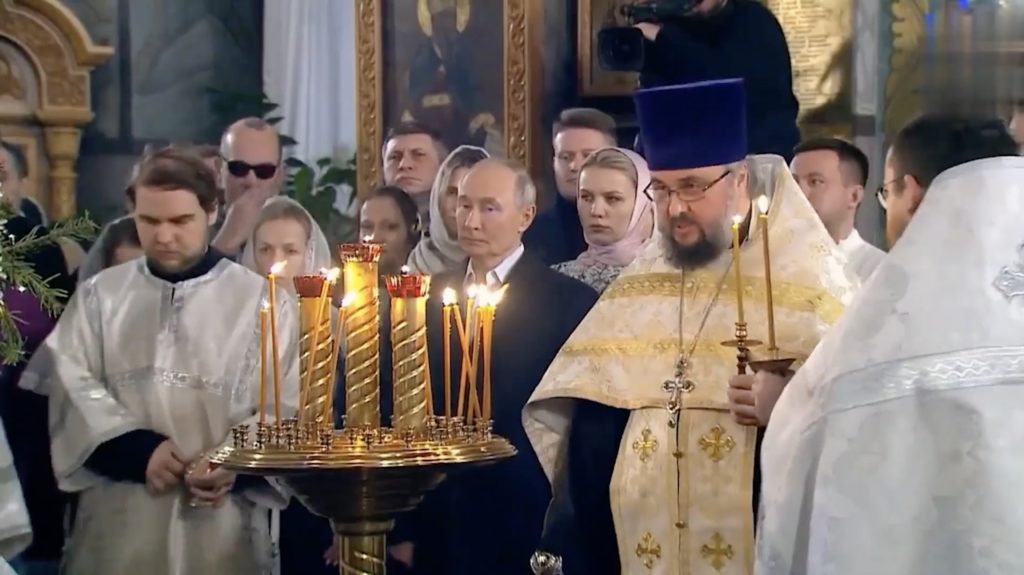Listen to the article
Russia’s Propaganda War: How the Kremlin Targets American Conservatives with Religious Messaging
Russian propaganda efforts, a decade-long strategy to influence elections in the U.S. and abroad, have evolved into a sophisticated component of Moscow’s war against Ukraine. A key element of this information warfare targets American conservatives with messaging that portrays Russia as a defender of traditional Christian values.
Russian President Vladimir Putin has carefully cultivated an image of himself and Russia as champions of Christianity and traditional values—a narrative that has found receptive audiences within certain segments of American politics, particularly the MAGA movement.
The strategy often relies on disinformation. One example involves footage of a church that burned down over a decade ago in a remote Russian village near Kazakhstan. Since the February 2022 invasion of Ukraine, this video has been recycled across Russian media with false claims that it shows Ukrainian forces destroying churches and persecuting religious communities.
“Although the story is untrue, the message that Ukraine is fighting against Christian values has turned into a powerful narrative used to justify the war to the Russian public,” reports special correspondent Simon Ostrovsky. Even the head of the Russian Orthodox Church frames the conflict as a “holy war,” blessing soldiers with promises of salvation.
This religious narrative isn’t designed solely for domestic consumption—it’s crafted for export to Orthodox neighbors, disillusioned Europeans, and increasingly, Americans who see parallels with their own culture wars.
The messaging has gained traction among some U.S. conservatives. Representative Marjorie Taylor Greene has echoed these claims, stating, “This is a war on Christianity. The Ukrainian government is attacking Christians. The Ukrainian government is executing priests. Russia is not doing that.”
Former Trump campaign strategist Steve Bannon and Blackwater founder Erik Prince have praised Russia’s stance on social issues, with Bannon describing Putin as “anti-woke” and Prince noting approvingly that in Russia, “people still know which bathroom to use.”
Recent polling confirms this shift, showing Republicans are now more than twice as likely to view Russia as a U.S. partner compared to previous years. While most Republicans and Christians still support Ukraine, a growing subculture on both the far right and far left has become increasingly hostile to Kyiv.
Mark Tooley, president of the Institute on Religion and Democracy, finds this trend concerning: “It is distressing that many people on the right are no longer adhering to traditional conservative values. By most measures, Ukraine seems to be more religiously practicing than Russia is, so it’s a pretext or an excuse for opposing Ukraine.”
Russian propagandists have effectively leveraged American media platforms to spread their message. Vladimir Solovyov, one of Russia’s most prolific propagandists, has hosted American conspiracy theorist Alex Jones, who told Russian viewers: “A lot of Americans admire Russia and admire you and admire Putin because you have been able to fight this off.”
Canadian-American lawyer Robert Amsterdam has repeatedly made false claims about Ukrainians burning churches and alleged that President Volodymyr Zelenskyy is waging a war against Christians—omitting that Zelenskyy’s wife is Ukrainian Orthodox and that the couple has baptized both their children in the faith.
Katherine Kelaidis from the Institute of Orthodox Christian Studies explains that while Ukraine’s controversial law requiring the Russia-aligned Orthodox church to merge with the independent Orthodox Church of Ukraine may have gone too far, it was motivated by legitimate national security concerns that have been widely misrepresented to American audiences.
“Russia is selling a spiritual war in order to win a geopolitical one,” Ostrovsky notes. “The fiction that Russia is a haven for white, straight, churchgoing families is smoothing the way for discussions about lifting sanctions on Russia and cutting off aid to Ukraine.”
The reality contradicts Russia’s carefully constructed image. The fastest growing religious group in Russia is Muslim, not Orthodox Christian. Despite the church’s prominent role in politics, Orthodox believers hit a 20-year low last year, with less than 1 percent of the population attending Christmas services, compared to approximately 50 percent of Americans.
Meanwhile, Russian forces have targeted evangelical Christians in occupied Ukraine and used terrorism laws to shut down hundreds of non-Orthodox congregations, including Jehovah’s Witness and Protestant churches—stories that receive limited coverage in American media.
Verify This Yourself
Use these professional tools to fact-check and investigate claims independently
Reverse Image Search
Check if this image has been used elsewhere or in different contexts
Ask Our AI About This Claim
Get instant answers with web-powered AI analysis
Related Fact-Checks
See what other fact-checkers have said about similar claims
Want More Verification Tools?
Access our full suite of professional disinformation monitoring and investigation tools




8 Comments
This article highlights the need for increased media literacy and fact-checking, especially when it comes to sensitive religious and political topics. We can’t let ourselves be manipulated by foreign disinformation.
The use of religious messaging to target conservative groups is a concerning tactic. We must be vigilant in scrutinizing the sources and verifying the accuracy of any claims made.
While religious messaging may resonate with some conservative groups, we must be cautious about accepting claims at face value. Critical analysis and independent verification are key to avoiding the pitfalls of propaganda.
Absolutely. Maintaining a healthy skepticism and fact-checking are crucial in this information landscape.
This is certainly concerning. Russia has a long history of using religion and ‘traditional values’ as a propaganda tool to influence conservative groups. We’ll need to stay vigilant against these deceptive tactics.
It’s disturbing to see how Russia is exploiting religious rhetoric to sway American conservatives. We must be wary of falling for their disinformation campaigns and stay committed to the truth.
Agreed. Fact-checking and critical thinking are crucial to avoid being misled by such propaganda.
Russia’s propaganda efforts are clearly escalating, and the religious angle is a particularly insidious approach. It’s essential that we call out these deceptions and defend the integrity of our institutions.